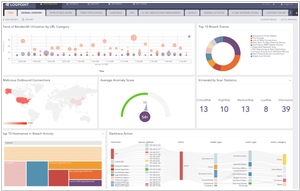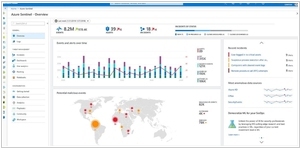Logpoint vs Microsoft Sentinel
July 31, 2023 | Author: Michael Stromann
See also:
Top 10 SIEM software
Top 10 SIEM software
Logpoint and Microsoft Sentinel are two well-established security information and event management (SIEM) solutions, but they differ in several key aspects. Logpoint is renowned for its user-friendly interface and quick deployment, making it an ideal choice for small and medium-sized businesses seeking a straightforward solution. It emphasizes log management and compliance reporting, providing out-of-the-box content for faster implementation and meeting regulatory requirements. In contrast, Microsoft Sentinel, part of the Azure cloud ecosystem, is a cloud-native SIEM platform with strong integration capabilities across the Microsoft product suite. Its focus extends beyond traditional SIEM functionalities, incorporating artificial intelligence and machine learning to analyze vast amounts of data and deliver actionable insights in real-time. Microsoft Sentinel is particularly advantageous for organizations heavily invested in the Azure environment, as it offers seamless integration and a unified security experience.
Another key difference lies in the deployment models of Logpoint and Microsoft Sentinel. Logpoint primarily offers an on-premises deployment option, catering to organizations with stringent data privacy and compliance needs that prefer to keep sensitive data within their own infrastructure. In contrast, Microsoft Sentinel is a cloud-native solution, providing the benefits of scalability, automatic updates, and reduced maintenance overheads, but it requires data to be sent to the cloud for analysis. This distinction might influence an organization's decision based on their cloud preferences, data privacy requirements, and existing infrastructure.
Lastly, the scope and focus of the two platforms differ. Logpoint's core strength lies in log management, enabling users to efficiently collect, store, and analyze log data from various sources. While it offers security analytics capabilities, it is primarily geared towards traditional SIEM use cases. On the other hand, Microsoft Sentinel takes a broader approach with an emphasis on AI-driven advanced analytics and threat intelligence. It aims to provide a more holistic view of an organization's security posture by integrating data from various sources, including logs, cloud services, and endpoints, and leveraging AI for advanced threat detection and response. Consequently, the decision between Logpoint and Microsoft Sentinel should consider an organization's specific needs, existing infrastructure, cloud preferences, and the level of analytics and automation required to meet their cybersecurity objectives effectively.
See also: Top 10 SIEM software
Another key difference lies in the deployment models of Logpoint and Microsoft Sentinel. Logpoint primarily offers an on-premises deployment option, catering to organizations with stringent data privacy and compliance needs that prefer to keep sensitive data within their own infrastructure. In contrast, Microsoft Sentinel is a cloud-native solution, providing the benefits of scalability, automatic updates, and reduced maintenance overheads, but it requires data to be sent to the cloud for analysis. This distinction might influence an organization's decision based on their cloud preferences, data privacy requirements, and existing infrastructure.
Lastly, the scope and focus of the two platforms differ. Logpoint's core strength lies in log management, enabling users to efficiently collect, store, and analyze log data from various sources. While it offers security analytics capabilities, it is primarily geared towards traditional SIEM use cases. On the other hand, Microsoft Sentinel takes a broader approach with an emphasis on AI-driven advanced analytics and threat intelligence. It aims to provide a more holistic view of an organization's security posture by integrating data from various sources, including logs, cloud services, and endpoints, and leveraging AI for advanced threat detection and response. Consequently, the decision between Logpoint and Microsoft Sentinel should consider an organization's specific needs, existing infrastructure, cloud preferences, and the level of analytics and automation required to meet their cybersecurity objectives effectively.
See also: Top 10 SIEM software





